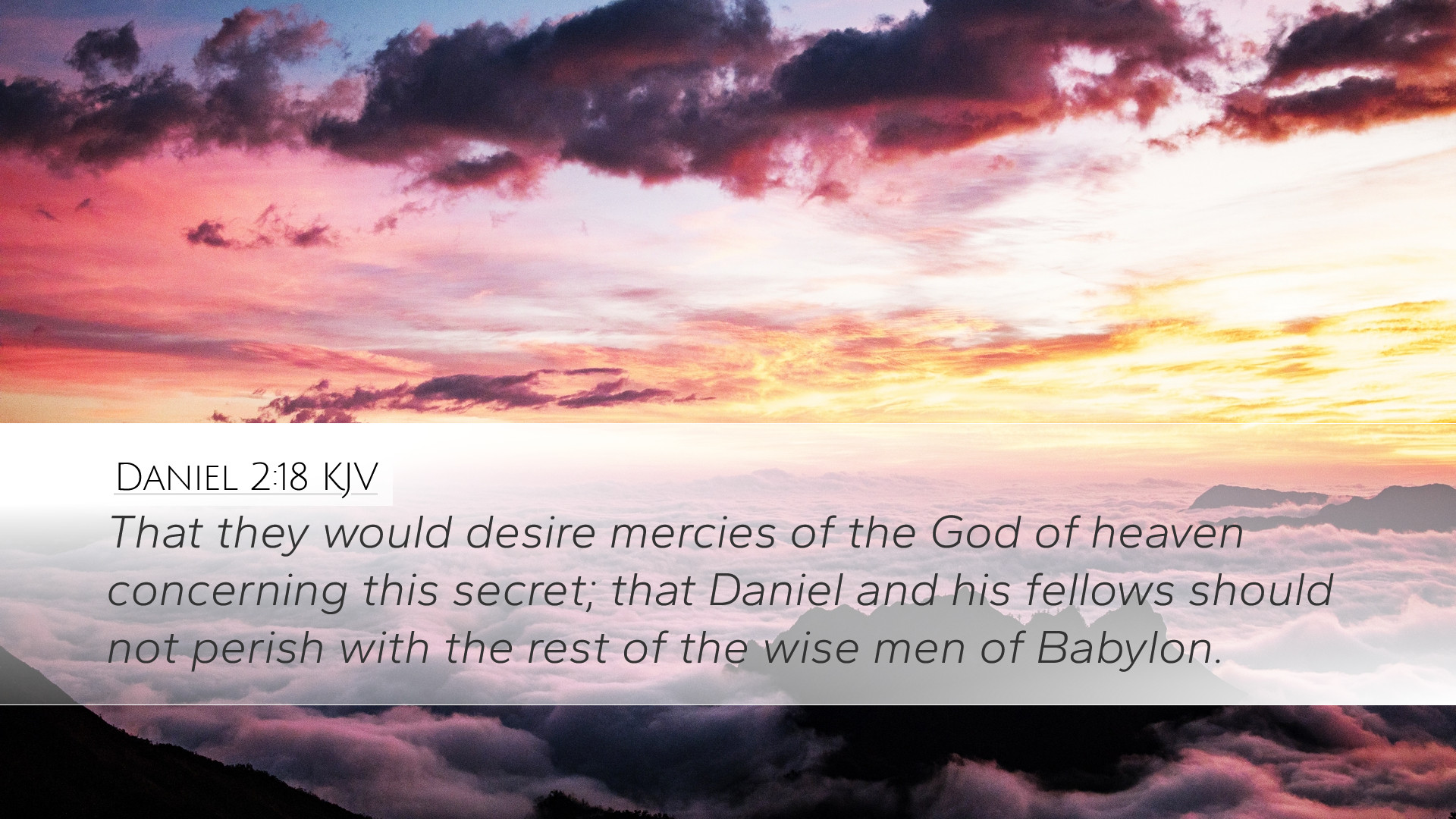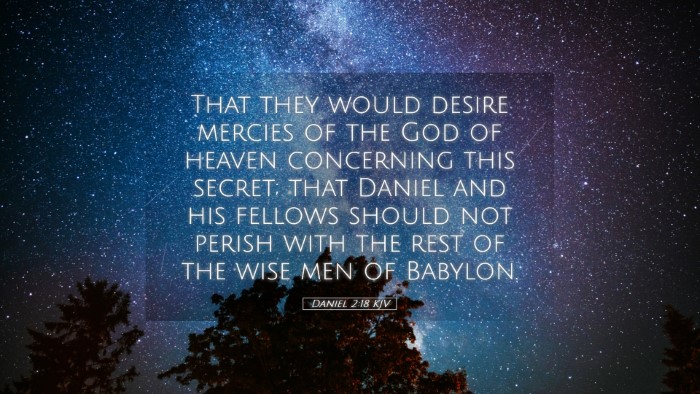Commentary on Daniel 2:18
Verse: "That they would desire mercies of the God of heaven concerning this secret; that Daniel and his fellows should not perish with the rest of the wise men of Babylon." (Daniel 2:18)
Introduction
In this pivotal verse from the Book of Daniel, we witness the intense plight of Daniel and his companions as they face imminent death due to King Nebuchadnezzar's decree to execute all the wise men of Babylon. This text encapsulates themes of prayer, divine mercy, and the role of faith in a seemingly insurmountable challenge.
Contextual Background
The narrative of Daniel unfolds during the Babylonian exile, a time of great upheaval for the Jewish people. Daniel and his friends, deported from Jerusalem, found themselves in a foreign land where their faith was tested. The king's troubling dream, which none of his wise men could interpret, sets the stage for divine intervention.
Commentary Insights
Matthew Henry's Commentary
Henry emphasizes the urgency of prayer in dire circumstances, illustrating Daniel’s immediate reaction to the crisis. He notes that Daniel did not seek the mercies of the king or rely upon human wisdom; instead, he turned to "the God of heaven." This acknowledgment of God’s sovereignty highlights a necessary dependence on divine guidance in times of distress.
Albert Barnes' Notes on the Bible
Barnes stresses the communal aspect of prayer reflected in this passage. Daniel seeks "mercies" not only for himself but for his companions. This solidarity showcases the importance of intercessory prayer within the body of believers. Barnes highlights that this reflects the understanding that God is the ultimate source of wisdom and salvation, reinforcing the necessity of outreach and earnest request for divine intervention.
Adam Clarke's Commentary
Clarke elaborates on the nature of the "mercies" being sought. He posits that they encompass not just deliverance from death but also understanding and revelation concerning the king's dream. Clarke elucidates the connection between divine mercy and human humility, indicating that God's willingness to reveal secrets is often contingent upon the supplicant's acknowledgment of their need for divine assistance.
Theological Reflections
This verse opens up a rich vein for theological reflection, particularly regarding the nature of prayer and God’s responsiveness to the cries of His people. The motif of seeking mercy is profound, revealing both the character of God as a compassionate listener and the necessity of human humility.
Prayer as a Means of Divine Interaction
Pastors and scholars can draw from this verse the essential doctrine that prayer is a vehicle for divine interaction. It is not merely a ritual act, but a heartfelt engagement with the Divine, rooted in faith. Daniel's prayer exemplifies earnestness; he directly connects the dire situation to God's ultimate authority and possibility for intervention.
Understanding Divine Mercy
The pursuit of mercies from "the God of heaven" highlights an essential attribute of God in biblical theology: His mercy. Understanding this attribute fosters a deeper appreciation for God's nature—His ability to forgive, provide, and reveal truth amidst human frailty and confusion.
The Role of Community in Prayer
Moreover, the communal aspect of Daniel’s plea introduces the concept of collective faith. In ministry contexts, the implications of praying together as a community can lead to powerful testimonies of faith and deliverance. The verse teaches that divine wisdom is often revealed in the context of shared faith and support.
Practical Applications
The lessons from Daniel 2:18 extend into the practical realm of pastoral care and teaching. Here are several applications:
- Encouraging Prayer: Pastors should emphasize the importance of prayer in their congregations, particularly prayers for divine intervention in personal and communal challenges.
- Diversity in Community Prayer: Foster environments where collective prayer for discernment and mercy becomes a regular practice, not just in moments of crisis.
- Teaching on Mercy: Incorporate lessons about the nature of God’s mercy in sermons and teaching, drawing parallels from Daniel’s situation to contemporary issues.
Conclusion
Daniel 2:18 serves as a poignant reminder of the power and necessity of prayer, particularly in challenging circumstances. It speaks to the heart of faith, calling believers to seek God’s mercy and wisdom actively. As both individuals and communities, engaging with God through prayer can lead to profound revelations and outcomes that demonstrate His sovereignty and grace.
In a world seeking answers and clarity, this verse encourages the faithful to turn their eyes toward "the God of heaven," the ultimate source of all understanding and mercy.


